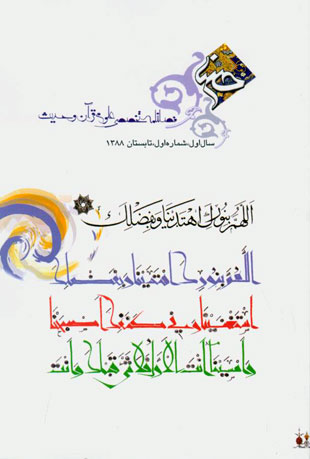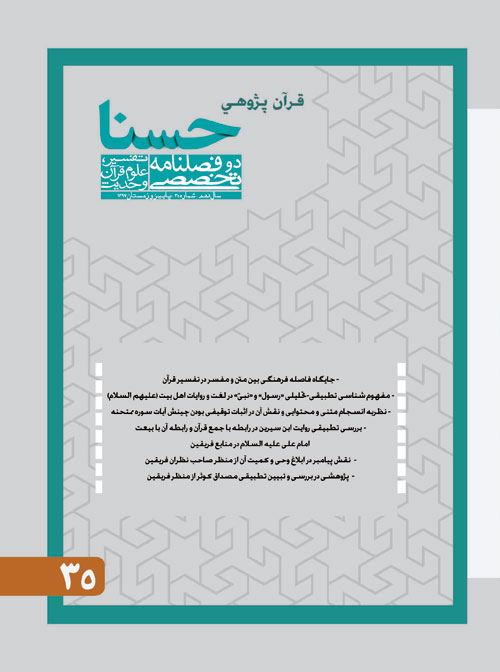فهرست مطالب

نشریه قرآن پژوهی حسنا
پیاپی 1 (تابستان 1388)
- 96 صفحه،
- تاریخ انتشار: 1388/06/20
- تعداد عناوین: 6
-
صفحه 16مساله گونه ها و انواع «روایات تفسیری» تا پیش از دهه های اخیر، به صورت جدی مورد توجه پژوهندگان معارف قرآنی نبوده است. پیشینیان با اینکه خود در جمع آوری و تنظیم روایات تفسیری، تلاش و کنکاش تحسین برانگیزی از خود نشان داده اند؛ ولی چندان اشاره ای به تنوع و گوناگونی روایات نکرده اند. گو اینکه آنان به کشف این نکته نائل نشده بودند؛ ولی در دهه های اخیر، شماری از پژوهندگان معارف قرآنی به بررسی، استقرا و نام گذاری این گونه ها اقدام نموده اند. بی تردید شناخت نظم یافته این انواع به بهره مندی آسان تر از این روایات خواهد انجامید.
در این نوشتار به مهم ترین گونه های روایات تفسیری اشاره می شود. گفتنی است هر چند این تقسیم بندی در نگاه نخست، ناظر به روایات تفسیری شیعه است؛ ولی روایات تفسیری اهل سنت نیز تا حدودی در قالب این تقسیم بندی قابل ارائه است. از این رو به نمونه هایی از روایات تفسیری اهل سنت نیز اشاره می شود و از حیث کمی و کیفی با روایات تفسیری شیعه مقایسه می گردد.
-
صفحه 36از زمان نزول وحی تاکنون، تفسیر قرآن کریم راه پرنشیب و فرازی را طی کرده و هر مفسری به فراخور فکر و اندیشه خود، با کندوکاو در معادن قرآن کریم و غواصی در ژرفای اقیانوس پرتلاطم این بحر مواج، گوهر عقل خویش را شکوفا کرده است و از سفره بیکران این نعمت الهی بهره جسته است. گروهی روش تفسیر عرفانی را برگزیده و با مذاق عرفانی طعم آیات الهی را چشیده اند و ظاهر و باطن آیات را با هم نگریسته اند. سرسلسله این گروه، ابن عربی است که با توجه به آیه «...فاعتبروا یا اولی الابصار» تلاش می کند از ظاهر قرآن کریم، به سوی باطن آن عبور نماید و حقایق قرآنی را با مکاشفات روحانی درآمیزد.
برخی قرآن کریم را از دریچه علم کلام نگریسته و تلاش وافر نموده اند آیات آن را صبغه کلامی دهند و نهایتا فهم خود را بر آن تحمیل نمایند. فخر رازی که تفکر جبری او برای همگان روشن است به هر آیه ای که می رسد و بوی جبر را از آن استشمام می کند، فیلش هوای هندوستان کرده وعقاید جبری را بر قرآن کریم تحمیل می نماید. معتزلیان نیز تلاش کرده اند آراء اعتزال و تفویض را برقرآن کریم تحمیل نمایند.
عده ای دیگر تلاش کرده اند روش تفسیر فلسفی را گزینش کنند و آیات قرآنی را با اندیشه فلسفی، تشریح و تبیین نمایند، ابن سینا و فارابی از این دست مفسران هستند که آیات الهی را با گزینش فلسفی چینش کرده اند. ابن سینا وسواس خناس را همان متخلیله می نامد که مرکب آن سینه های انسان هاست و جن و انس را همان حواس ظاهر و باطن می پندارد.
-
صفحه 46شبهه تحریف قرآن کریم از دیر زمان مطرح بوده و پیوسته مورد انکار و رد علما و محققین بزرگ اسلام بوده است، جز برخی گروه ها یا ا فرادی که به دلیل آشنایی اندک با اصول و پایه های عقاید اسلامی شبهه را مهم دانسته و خواسته اند به گونه ای آن را توجیه کنند. منشا این شبهه برخی از اخباری است که در کتب روایی اهل سنت و شیعه درج شده است که به ظاهر تحریف کلام الهی را می رساند، لکن این دسته از روایات در مواردی قابل تاویل بوده و تعداد کثیری از این اخبار نیز به لحاظ سندی از ناحیه غلات، مجاهیل، ضعفا وغیر ثقات بوده، بدین جهت نزد محدثان بزرگ شیعه فاقد اعتبار و حجیت است. در این مقاله سعی شده با بررسی دلالی و سندی مهم ترین روایت تحریف، یعنی تحریف سوره نساء و به خصوص آیه سوم آن که در آن ادعای حذف ثلث کلام الله شده، صیانت و سلامت لفظی قرآن، مستند شود.
کلیدواژگان: تحریف قرآن، اخبار تحریف، بررسی روایات -
صفحه 70مقاله حاضر با هدف تاکید بر ضرورت معرفت شیعه در فهم و درایت حدیث، به کتاب «تلخیص و تحقیق مقباس الهدایه» استاد دکتر علی اکبر غفاری رحمه الله استناد کرده است. زیرا یکی از ملحقات این استاد را در پایان این کتاب تحت عنوان «فهم و درایت حدیث» بهترین شاهد مثال برای حدیث امام صادق علیه السلام می توان یافت که فرمودند: «إن الله لم یاخذ علی الجهال عهدا بطلب العلم، حتی اخذ علی العلماء عهدا ببذل العلم للجهال» خداوند قبل از اینکه مردم عوام را بر فراگرفتن علم دین متعهد سازد، علماء را بر دریغ نکردن علم از عوام، متعهد ساخت.
استاد علی اکبر غفاری رحمه الله با استدلال به ملزومات فهم و درایت حدیث در هفت محور: عرضه محتوای روایت به آیات قرآن کریم، تحقیق و تفحص در مورد وضعیت صدور حدیث، تتبع و جستجوی کامل در تشخیص و یافتن اصل حدیث از لفظ منقول آن، تشخیص و تمیز مفهوم حدیث بر اساس معنای ظاهری یا غیر آن، شناخت عام و خاص، مطلق و مقید احادیث، تشخیص ناسخ و منسوخ احادیث و شناخت و آگاهی نسبت به وضعیت صدور احادیث در شرایط تقیه، با ذکر مثال های روشن ضمن اظهار تعهد و انجام رسالت الهی با نگرانی از کاربرد احادیث در وجوه نامناسب و در نتیجه آسیب پذیری آن سخن می گوید.
-
Page 16The subject of the types and kinds of ((interpretive traditions)) had not beendealt with seriously by researchers of the Quranic sciences before the recent decades.Although, the predecessors have made an admirable effort and study to gather andregulate the interpretive traditions; They have not referred much to the variety of thetraditions. As though, they had not succeeded in finding out this point. However, anumber of the researchers of the Quranic sciences have made an effort to consider,induce and name these types over the recent decades. Certainly, the systematic.understanding of these kinds would lead to easier profiting from these traditionsThe most important types of interpretive traditions are referred to in this writing. It isto be mentioned that although this division provides for Shiite’s interpretive traditionsin the first glance, the interpretive tradition of Ahl-e Sunnat may have been partiallydemonstrated in the form of this division. Therefore, there would be also a referenceto the types of interpretive traditions of Ahl-e Sunnat herein and it would be compared.with Shiite’s interpretive traditions in quantitative and qualitative respect
-
Page 36The comment of holy Quran has gone through a way full of ups and downs since thetime of descending the revelation and every commentator according to his proportionof thought, by searching in the jewelry mines of the holy Quran and diving into the depthof the ocean full of turbulence of this wavy sea has made his wisdom nascent and hasbenefited from the boundless spread of this divine blessing. Some commentators havechosen the mystical method of commentary and tested the flavor of the divine versesby mystical feeling and looked at the surface and the heart of the verses both together. The founder of this group is Ibn-Arabi who considering the verse “فاعتبروایااولی البصار” tried to pass through the surface of the holy Quran toward its heart and could mingle. the Quranic insights with spiritual contemplations
-
Page 46The distortion doubt of holy Quran is an age-old subject which has been constantlyrejected and denied by the eminent Muslim scholars and researchers, with theexception of some groups or people who, due to having insignificant knowledge aboutthe principles and basics of the Islamic thoughts, considered the doubt significant andtried to justify it anyhow. The source of the doubt is some narrations which have beenincluded in Hadith books of Ahl-e Sunnat and Shiah and seemingly mean the distortionof the divine word. Although this kind of traditions in some cases are justifiable, butmain part of these narrations due to being narrated by overstaters, ignorants, theweak and unreliable people are weak; Therefore the great Shiite narrator of traditionsconsider them invalid and irrational. In this article the try has been to provide evidenceof integrity and the verbal limpidity of Koran by review of the reasons and thedocument of the most important distortion tradition, i.e. the distortion of Surah Nesaaand especially the third verse of the Surah which is related to traditions claiming that.third of the Koran has been left out.
-
Page 70This article, with aim to emphasize on the necessity of having Shiite insight inunderstanding the Hadith, has relied on the book “Talkhis va Tahghigh-e MeghbasolHedaya” (The Summary and Research of Obtained from the Guidance) written bylate professor Dr. Ali Akbar Qhaffari, Because one of the attachments at the end ofthis book with the title of “Understanding the Hadith” is best evidence for Imam Sadeq: (A. S) ’s Hadith which says “إن الله لم یأخذعلی الجهال عهداًبطلب العلم،حتی أخذعلی العلماءعهداً ببذل العلمللجهال” God has obligated the common people to learn the religious knowledge after he had. obligated the Ulama not to withhold the common people from knowledgeProfessor Ali Akbar Qaffaari (God blesses him) giving the necessities of understandingof Hadith as reason, expresses under seven topics: Contrasting the content of theHadith with the verses of the holy Quran, Examining and studying about the status ofarticulation of the Hadith, Complete research and study on recognizing and finding themeaning of Hadith from the its wording, Finding and uncovering the meaning of theHadith based on the apparent meaning or other grounds, Recognition of generality andspecialty and of the conditionality and non-conditionality of the Hadith, Recognition ofthe nullifier Hadith from annulled Hadith and, Understanding status of articulation ofHadith under Taqieh conditions. He provides some clear examples while expressinghis commitment and fulfilling the divine task and he worriedly talks about the misuseof Hadith in unreasonable manners and as a result talks about the pathology of. understanding Hadith.


